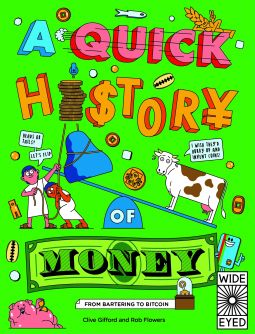
A Quick History of Money
From Cash Cows to Crypto-Currencies
by Clive Gifford
This title was previously available on NetGalley and is now archived.
Send NetGalley books directly to your Kindle or Kindle app
1
To read on a Kindle or Kindle app, please add kindle@netgalley.com as an approved email address to receive files in your Amazon account. Click here for step-by-step instructions.
2
Also find your Kindle email address within your Amazon account, and enter it here.
Pub Date 6 Jul 2021 | Archive Date 3 Aug 2021
Quarto Publishing Group – Wide Eyed Editions | Wide Eyed Editions
Talking about this book? Use #AQuickHistoryofMoney #NetGalley. More hashtag tips!
Description
Why is a £5 note worth £5? Where do coins come from? What do banks actually do? All this and so much more is answered in A Quick History of Money, a crash course from cash cows to cryptocurrency.
Money might sound all grown-up and serious, but the history of buying, selling, saving and stealing is full of crazy stories and unbelievable facts. A Quick History of Money is here to show you the silly side, as well as give you the lowdown on the important stuff like interest, stocks and shares and wealth inequality.
You will discover:
How the earliest societies got by without a penny in their pockets.
Why gold gets all the glory.
How the first banks started making money from money.
Who invented the first banknotes and the concept of ‘fiat’ money.
The craziest money-making cons of all time, from shaving coins to selling the Eiffel Tower… twice.
How wealth is measured in the modern-day.
History’s most expensive money mistakes.
What money might look like in the future.
Great tips for slick saving and smart spending.
Plus, read about the world’s weirdest wonga, from the four-tonne stones used as currency on the island of Yap, to teacups and sea shells in ancient Asia, to beaver pelts in colonial Canada. Learn how hyperinflation leads to some mind-blowing money maths, like the Bitcoins used to buy two pizzas in 2010 that would be worth £75 million today. Test your knowhow with a quiz at the back of the book.
Packed with facts and jokes, the latest in the Quick Histories series takes us on a chronological tour from cashless societies to… cashless societies, proving that while it might make the world go round, money sure is funny.
Available Editions
| EDITION | Paperback |
| ISBN | 9780711259836 |
| PRICE | £9.99 (GBP) |
Average rating from 1 member
Featured Reviews
Cash, dosh, dough, wonga, whatever you call money, there is a lot of it about, but seemingly never enough in our own pockets. Money is an imaginative human invention. It's the idea of using something with an agreed value that is accepted by people to make buying and selling transactions easier. The commodities that can be bought and sold can be almost anything, provided there is demand for it and a supply, from cheese to tea, clothes to horses and even children (thankfully many moons ago). Money also makes it easier to measure and compare and allows people to put a price or value on objects or work they carry out.
This book takes you through money’s amazing journey, from mighty, moneyless empires to the pizzas worth $270 dollars and along the way checking out history’s wealthiest individuals, how banks make money from money and what the future may hold for money and you. It begins by exploring ancient moneyless societies then touches upon stocks and shares, ATMs, cryptocurrency and wealth and its association with inequality. An interesting, informative read covering a lot of topics involving the history of money, and although categorised as children's nonfiction, I, as an adult, learned quite a lot that I didn't actually know. Highly recommended.



